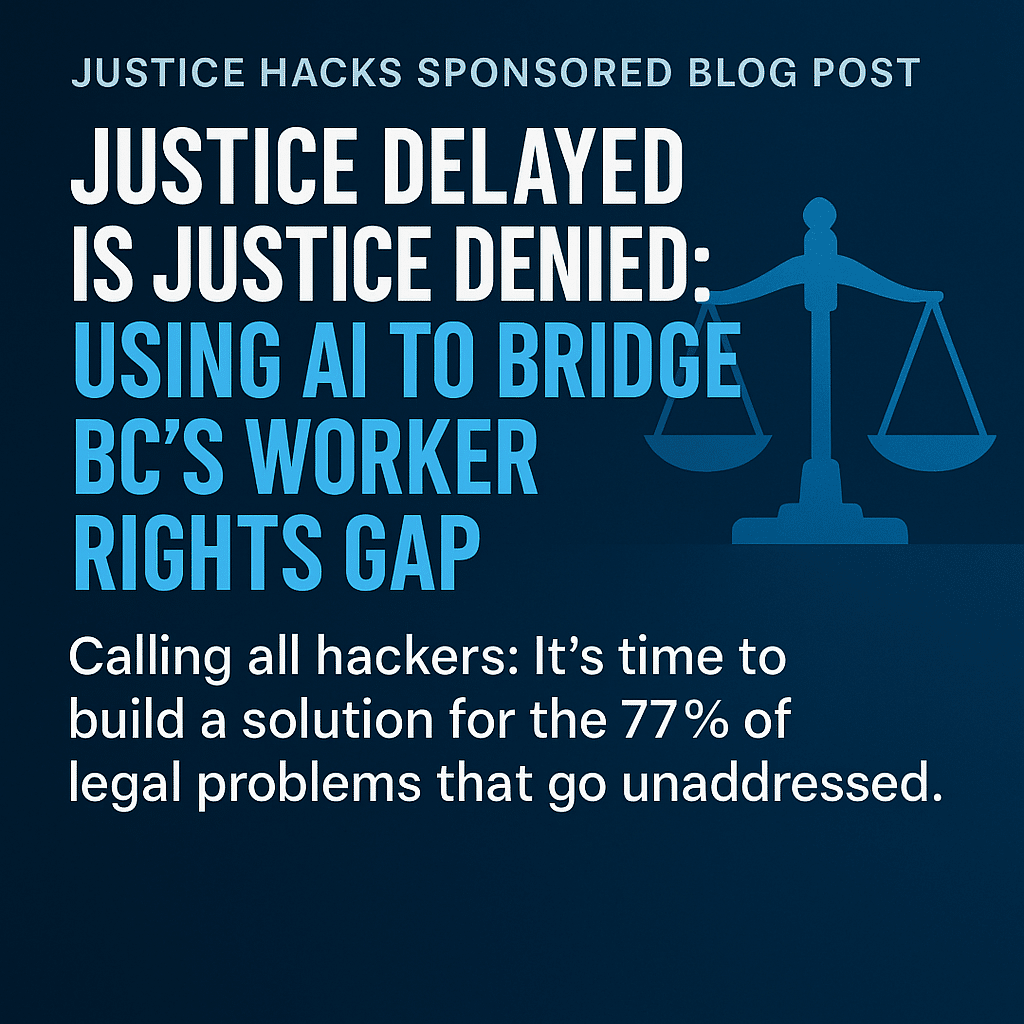This post is generously sponsored by Clio, a long-time supporter of The Justice Hack
Calling all hackers: It’s time to build a solution for the 77% of legal problems that go unaddressed.
The theme of this year’s The Justice Hack—access to justice for worker and employment rights—is highly relevant in British Columbia. For thousands of employees facing unfair dismissal to unpaid wages and workplace discrimination, the legal system designed to protect them often becomes another barrier.
The challenge isn’t just a shortage of lawyers; it’s a lack of speed. According to BarTalk, a discrimination complaint filed with the BC Human Rights Tribunal can take 18 months or more just to be screened and served on the employer. This delay isn’t just inconvenient; it can destabilize a worker’s life while their livelihood hangs in the balance.
With this discouraging reality, it’s no wonder that the broader access to justice gap persists. The Canadian Bar Association says that roughly 80% of legal problems never receive legal assistance. For most workers, the prospect of a years-long legal battle is enough to deter them from ever seeking justice.
The Opportunity: Speed and Equity through AI
To close the justice gap, we need to rethink how legal work is done. AI isn’t just a productivity tool for lawyers; it is an equalizer that targets the root causes of delay and inaccessibility.
1. Eliminating Administrative Drag to Gain Speed
Today, legal professionals are often buried in repetitive administrative work— summarizing long email chains, managing documents and tracking deadlines. This mental strain and unproductive effort are what fuel the 18-month average resolution time for employment cases.
AI can serve as an instant legal assistant, handling these high-volume, low-value tasks. At Clio we value this, and it’s part of why we just launched the first-ever Intelligent Legal Work Platform, Clio Work. With Clio Work’s launch, Clio delivers on the promise of a true system of action. The result is a unified AI platform that anticipates what needs to happen next, accelerates complex tasks, and creates new opportunities for lawyers to deliver higher-value work with greater precision and speed.
2. Boosting Accuracy for Better Outcomes
In complex human rights and wrongful dismissal cases, accuracy is everything. A single misstep in evidence management or legal interpretation can undermine an entire claim.
AI can greatly improve the work performance when completing a task. Applied in the legal context, this means AI can:
- Surface Key Details: Instantly interpret thousands of pages of legal documents and employment contracts.
- Guide Next Steps: Provide lawyers with contextually relevant case law to build stronger arguments.
- Improve Outcomes: Allow lawyers to focus their expertise on strategy and client relationships rather than research.
Clio’s latest Legal Trends Report saw that lawyers using Clio’s AI for document review are twice as likely to provide the correct response.
We also partnered with Neuro-Insight for an in-depth neurological study (a new addition to this year’s report), and confirmed that using legaltech reduces a lawyer’s overall cognitive load (mental energy) by 25%.
The Future is Fast and Fair
Up to 74% of billable work done by the average law firm (documenting information, research, and data analysis) could be automated by generative AI. If the average resolution time for employment cases currently sits at a frustrating 18 months, AI offers the roadmap to drastically shorten that timeline. By accelerating behind-the-scenes legal work and enhancing both efficiency and accuracy, AI ensures two things:
- More Clients are Served: Lawyers can take on more cases, chipping away at the 77% of unmet legal needs.
- Justice is Timely: Workers gain access to resolutions when they need them most, reducing both financial and emotional strain.
This year’s challenge is an invitation to reimagine how technology can close BC’s worker-rights gap, faster, fairer and for everyone. Justice shouldn’t take 18 months to begin. Let’s make timely, equitable outcomes the standard, not just the exception.
